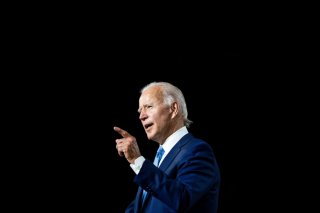How The “Commander-in-Chief Test” Distorts the Politics of U.S. Foreign Policy
Presidential image-making has a tendency to take U.S. foreign policy in a hawkish direction.
This argument helps explain why Americans are consistently frustrated with the cost and scope of their country’s foreign policy. The frustration comes from the fact that leaders consistently reject public demands to restrain the growth of military expenditures, to curtail open-ended military interventions, or to share more of the burden of global leadership with allies. And this behavior remains consistent because leaders are not simply ignoring public opinion. Instead, leaders frequently face tradeoffs between satisfying voters’ policy preferences and cultivating impressions of foreign policy competence. Aligning U.S. foreign policy with voters’ preferences is easier said than done, and it is not always the best way for leaders to maximize their public standing.
The way that the politics of image-making steers U.S. foreign policy in hawkish directions is particularly worrisome with respect to U.S.-China relations, where presidents and presidential candidates have incentives to use their China policies as proving grounds for demonstrating their vigilance against great power competition, for showing that they will not back down in the face of aggression, and for portraying their rivals as complacent about threats to U.S. national security. Candidates in any given election cycle have incentives to avoid taking their hawkishness too far, lest they be accused of possessing poor judgment. But if every new set of leaders pushes that envelope, then U.S.-China relations could end up in a place that is substantially more conflictual than what anyone would deliberately choose in advance.
Understanding the ways that leaders use foreign policy issues to shape their personal images also reveals important flaws with America’s foreign policy discourse. Though it seems entirely reasonable for voters to subject potential presidents to a “commander-in-chief test,” these efforts can distort U.S. foreign policy in significant but underappreciated ways. These distortions stem from the fact that it is relatively simple for presidents and presidential candidates to use hawkish foreign policies as tools for crafting impressions of leadership strength. That logic is similar to how car commercials often focus on sleek visuals rather than providing information about how well cars run. Even if customers do not place a particularly high value on a car’s aesthetics, it is easier for television ads to make cars look visually appealing, and so that is where advertisers focus. Conversations about foreign policy competence similarly gravitate towards considerations of leadership strength, because that attribute is relatively straightforward for voters to evaluate.
This argument does not imply that voters should delegate the commander-in-chief test to experts, because party leaders and political pundits are not necessarily in a good position to make those judgments, either. A large volume of research demonstrates that it is inherently difficult to assess the personal attributes of people we do not know well. This is true even when experts have substantial incentives to make accurate judgments, as with employers conducting job interviews or judges making bail decisions. In many cases, attempting to judge other people’s personal traits can be actively counterproductive, because these judgments end up serving as vehicles for biases and stereotypes. Such difficulties are likely to be especially severe when attempting to assess the competence of political leaders who specialize at image-crafting, who employ large teams of public relations specialists to enhance their personal appeal, and who can be remarkably cynical in seeking to manipulate public perceptions of their fitness to be commander-in-chief. If anything, it is thus likely harder for voters to form accurate beliefs about presidential candidates’ foreign policy competence than to develop reasonable preferences on major foreign policy issues. If citizens stuck to the issues when deciding who would do a better job of serving as commander-in-chief, they might end up being better-off.
Jeffrey A. Friedman is an Associate Professor of Government at Dartmouth College. This essay is excerpted from his forthcoming book, The Commander-in-Chief Test: Public Opinion and the Politics of Image-Making in U.S. Foreign Policy (Cornell, 2023).
Image: Shutterstock.com.

